
6 Best POS Systems for Quick-Service Small Restaurants
Table of contents
- How do we choose the best quick-service POS tech?
- Top 6 Small Restaurant POS Systems
- #5: SwiftPOS
- #4: SalesPlay
- #3: Triniteq
- #2: Oracle MICROS
- #1: Otter POS
- Why is Otter ideal for small, quick-service restaurants?
- Small/Quick-Service Restaurant POS System FAQs
- Help your small eatery earn big profits with great POS tech!
In the past, restaurant owners that weren’t backed by a major brand had a tough time competing with massive, nationally-distributed franchises. With the advanced features of today’s POS software and hardware, though, small restaurants are able to build unique customer relationships, providing critical access to revenue streams that larger businesses can’t capture. The right POS platform is essential to maximizing profit for business owners of independent restaurants – but how do you know which is the best?
With so many factors to consider when choosing a POS provider – like upfront costs, processing fees, restaurant management capabilities, and ease-of-use – committing to a single option for your specific needs can seem overwhelming. Fortunately, Otter’s digital restaurant experts have the POS solution for your business’s demands! Our team has narrowed the selection down to six top players ideal for the restaurant industry’s quick-service participants.
Below, you’ll find a thorough evaluation of today’s most powerful POS hardware, complete with information on pricing, add-on integrations, ecommerce connectivity, and more. We’ve tailored this list to the unique needs of small and quick-service eateries, so your team will have all the functionality it needs to strengthen revenue. Use this list to understand each POS terminal’s abilities in menu management, collecting sales data, and streamlining day-to-day restaurant operations, and get the best restaurant POS system for your bottom line.
How do we choose the best quick-service POS tech?

The Otter team is made up of POS leaders in the restaurant businesses, and we’re at the forefront of user-friendly management systems throughout food service. Our own all-in-one platform – Otter POS – helps restaurants worldwide streamline their day-to-day processes and provide better customer experiences in an intuitive, customizable ecosystem. Through a diverse range of cross-platform relationships, we work with fellow key players in restaurant tech and constantly stay informed of innovation in our space.
We’ve selected and examined the following POS platforms based on restaurant owners’ top priorities: real-time payment processing abilities, employee management features, onboarding speed, pricing (plus monthly fees), and resources available for customer support.
We’ve identified each platform’s competitive advantages, highlighting individual strengths in digital-first areas. This countdown outlines the most valuable assets each leading POS brand offers to small and quick-service restaurants, helping you determine which solution works best alongside your staff. By understanding how these systems can support your business, you’ll have a clear path to consistent, reliable profit.
Top 6 Small Restaurant POS Systems
#6: Toast POS
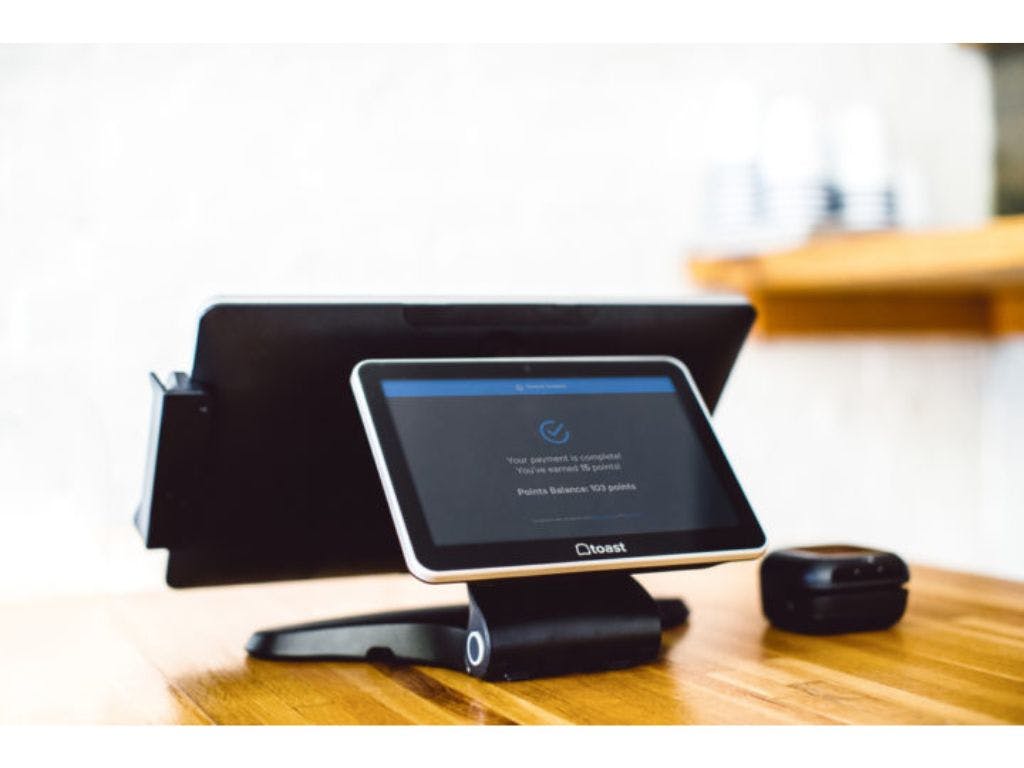
Toast POS is a common sight in today’s restaurants – it’s one of the more popular POS platforms available, and supports an extensive customer base. The platform is made for restaurant functionality, and offers several features to help owners and staff complete service in a timely, efficient manner. A variety of hardware options, like handheld devices, kitchen display systems (KDSs), and customer-facing checkout terminals, let Toast’s user base of over 120,000 restaurants personalize their experience, as well.
Pros:
- Restaurant management features, reducing need for redundant tech
- Various hardware options for different team responsibilities and eater convenience
- A 24/7/365 customer support hotline for assistance
- Strong reputation throughout the restaurant industry, having received several awards
Cons:
- Poor integration with top delivery platforms, leading to order errors and delays
- Certain features, like offline functionality and receipt printers, cost additional fees
- Users must sign long-term exclusivity commitments, potentially limiting revenue
- Non-basic plans are significantly costlier than competitors, especially for small eateries
- Some issues with UI accessibility – system has a learning curve, and is updated often
Pricing: Core Toast POS features are available from $69/month. Additional features are provided on a custom pricing model, and are exclusively quote-based.
Recommendation: The Toast POS platform’s advantages lie in its specialization – the system’s hardware and software are built specifically for restaurateurs, and many pricing options are aimed at small and quick-service eateries. Business owners who only need basic order functionality may find Toast works well for their day-to-day operations. Those looking for anything beyond the brand’s core hardware may find themselves overwhelmed by vague, unclear fees and a fluid, frequently-changing user experience, though.
#5: SwiftPOS
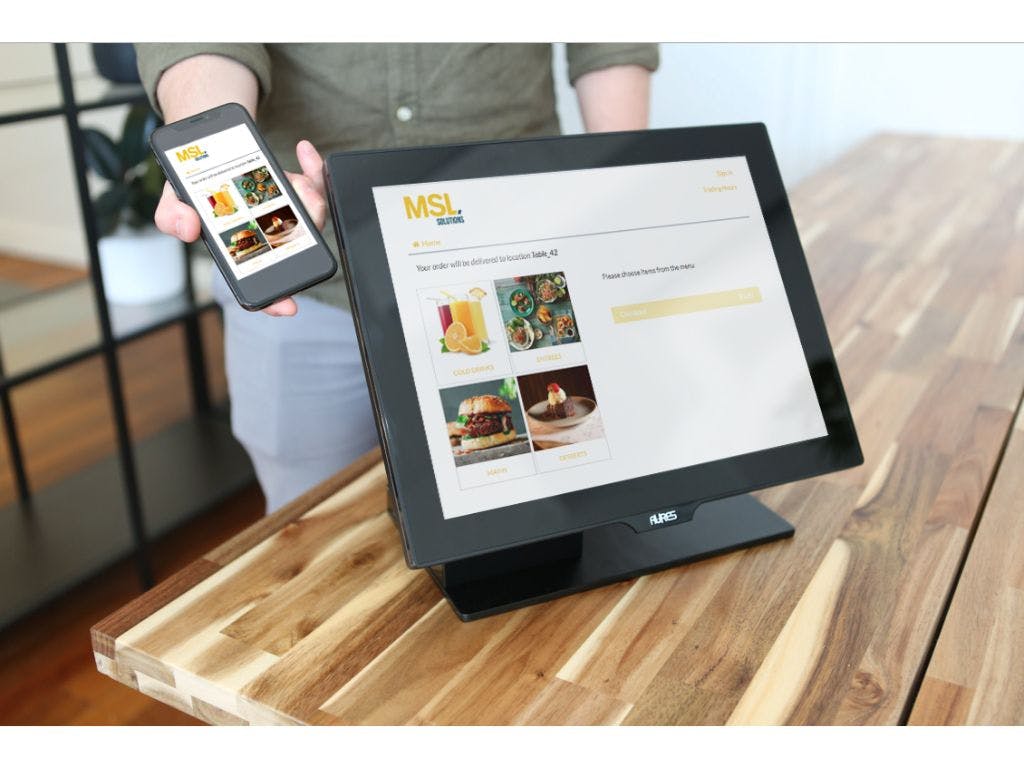
Developed by Brisbane, Australia-based technology firm MSL Solutions, SwiftPOS is an order processing system built for speed and reliability in fast-paced environments. Among its diverse client base, the platform services small quick-service eateries like bars, nightclubs, and cafes, alongside restaurants operating out of stadiums and sports arenas. SwiftPOS’s solutions are offered through the brand’s first-party hardware and thorough integration with all major mobile devices, keeping the amount of physical technology needed for service low.
Pros:
- Platform has some features and hardware options designed for small eateries
- High level of third-party integrations for in-store service, online ordering, etc.
- Thorough connectivity and data synchronization with Apple/Android mobile devices
- Developers are well-regarded throughout the digital restaurant and retail spaces
- Built-in digital ordering functionality is robust and user-friendly
Cons:
- Vague, exclusively quote-based pricing model, preventing long-term revenue planning
- One-on-one customer support teams are based in Australia, limiting accessibility
- Only a basic range of POS solutions offered; little advanced functionality
- Brand is not restaurant-focused, leading to some redundancies for QSR eatery owners
- Most features are made for multi-location franchises, not independent restaurants
Pricing: All SwiftPOS tools are offered on an exclusively quote-based pricing model provided by MSL Solutions’ Sales team.
Recommendation: Business owners looking for credibility behind their POS provider will be satisfied by SwiftPOS – the system is Australia’s #1 order processing tool, and is developed by a major player in retail technology. This platform’s base functionality is quite strong, but restaurant owners needing features for anything beyond order and payment tools will need to use third-party integrations instead of built-in apps. American restaurateurs specifically may see a slow turnaround time on requests from the brand’s internal support team, as well.
#4: SalesPlay
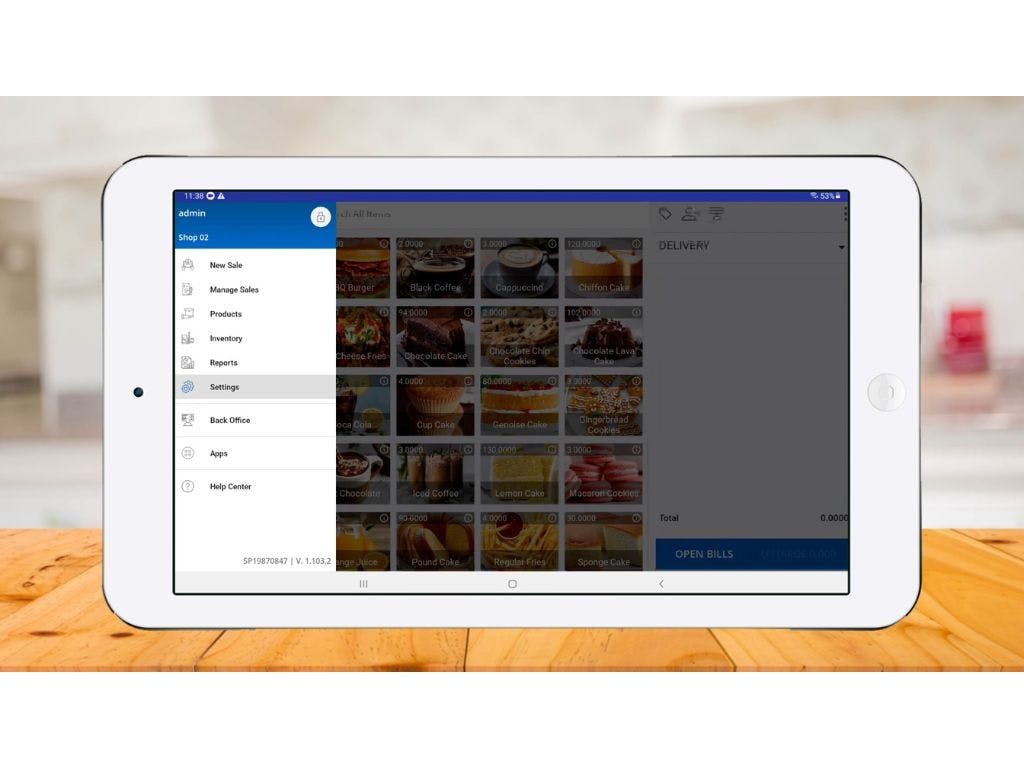
SalesPlay’s POS platform offers an array of base-level order and business data collection features – for free. The brand’s various products are provided through an exclusively software-based model, available from Android and iOS app stores, and let a limited number of restaurant staff take, serve, and fulfill orders using their personal devices. Users interested in advanced functionality can also upgrade their SalesPlay software at any time with a selection of paid add-ons, granting customizability throughout your restaurant’s workflow.
Pros:
- Low startup costs – all base features are provided completely free
- Easy to begin using – POS app is downloaded from Google Play/Apple App Store
- No first-party hardware required to start – software uses staff’s own mobile devices
- Strong core feature set for taking orders, collecting eater data, reviewing revenue, etc.
- Integrates with some front-of-house tech (barcode scanners, digital cash drawers, etc.)
Cons:
- Brand has poor reputation with restaurant owners – low review scores across app stores
- Customer support resources are vague, limited, and slow – no 24/7 support hotline
- No software integration with other restaurant tools, like Touchbistro, SpotOn, or Square
- Quote-based software costs required for businesses with more than 5 employees
- Platform has far fewer features, even in basic applications, than other top POS systems
Pricing: Base POS, ordering, and customer data features are provided through a free app download, requiring registration. Additional features range from $5/month to $200/year.
Recommendation: SalesPlay’s range of free order and business activity solutions may appeal to restaurateurs at the start of their career, but there’s little for established small business owners to find value in. A reliance on users’ own mobile devices prevents scalable business growth, as does limited functionality for modern restaurant processes, like promotions or online ordering. The Salesplay brand isn’t well-recognized or well-regarded throughout the restaurant industry, either, and offers little in the way of customer support and third-party app integration.
#3: Triniteq
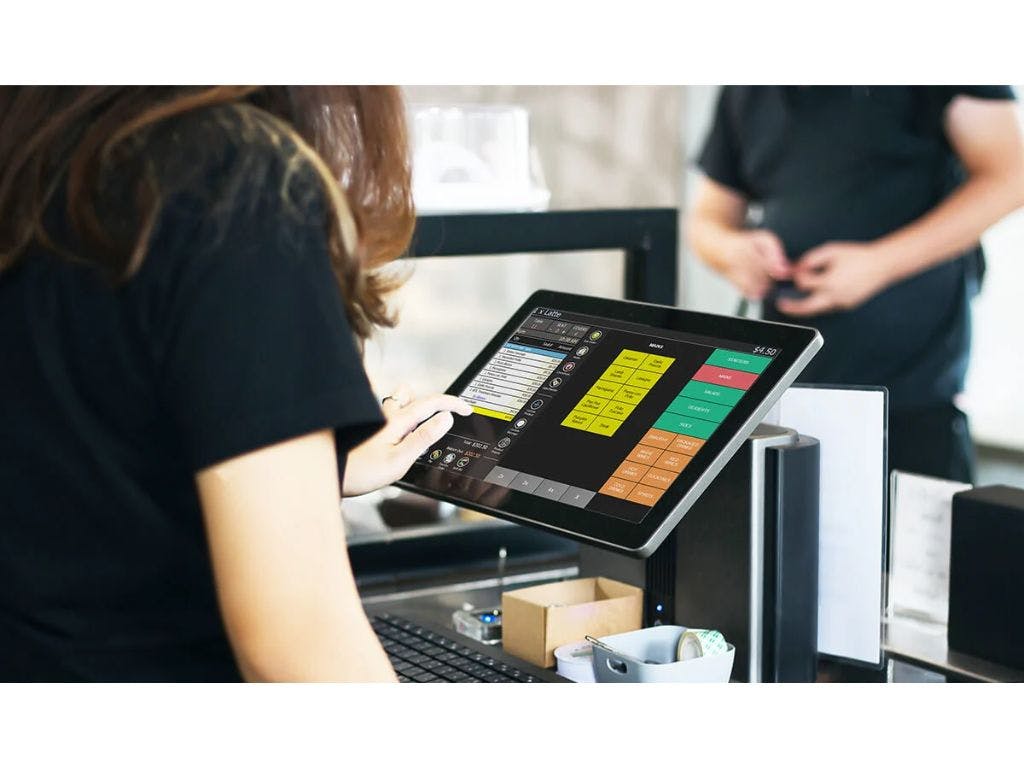
The Triniteq POS platform bills itself as an order-processing tool that aims primarily to strengthen revenue and profitability across the retail space. Triniteq’s user base is mostly made up of small and quick-service restaurants, like bars, cafes, and clubs, and many of the system’s features are geared towards this audience. All of Triniteq’s solutions are designed to enhance typical POS processes for both business administrators and eater-facing waitstaff, and the development team is passionate about supporting restaurateur success.
Pros:
- Extremely-focused feature line made for POS efficiency, productivity, and profit
- Brand is very well-established in the restaurant space, and has operated since 1997
- Customer support is high – a 24/7 helpline is available, plus detailed documentation
- Upfront hardware costs are relatively low among the platform’s competitors
- Significant third-party software integrations – some of which are free
Cons:
- All built-in, first-party features are made for order processing – no advanced tools offered
- Software can be difficult to use – a learning curve is necessary for staff members
- Some functionality is only available in the platform’s home country of Australia
- Only integrates with first-party hardware, sold exclusively through the Triniteq store
Pricing: Core POS package is available for about $37 USD per store/month. Additional licenses, features, and integrations range from about $4 to $34 USD per store/month.
Recommendation: As a POS platform, Triniteq has a very respectable set of first-party order features, and the development team is often praised for its eagerness to collaborate with client businesses. When using Triniteq, you’ll have many profit-focused POS tools at your fingertips, which can make in-house service much more valuable. The system’s limited functionality beyond orders, combined with a somewhat-complex user interface and reliance on first-party hardware, might prevent certain users from being completely satisfied, though.
#2: Oracle MICROS
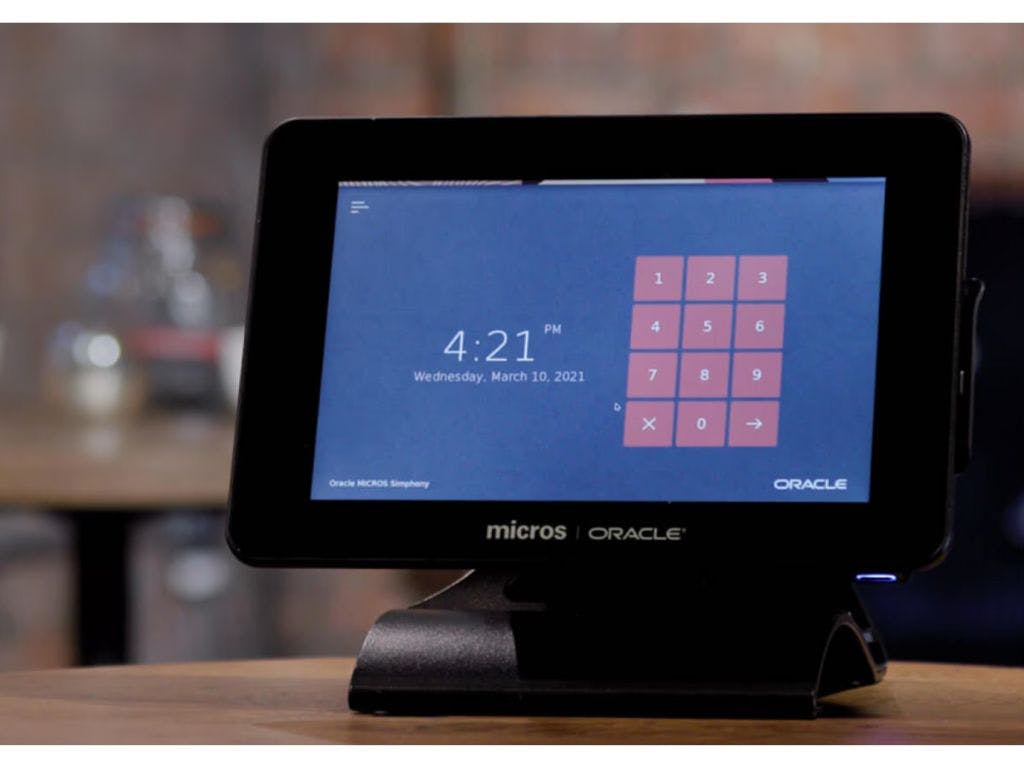
Developed by one of the leading brands in retail-based corporate technology, MICROS (also known as “Simphony” or “Hospitality”) is Oracle’s first-party POS platform. The system is developed for customer-facing storefronts in various industries, and offers several tools and features for restaurant owners, like menu management, staff scheduling, and eater loyalty programs. With a selection of different hardware models and add-on integrations, MICROS users can customize the platform to their business’s own service style.
Pros:
- Customer and business data is kept secure by Oracle’s industry-leading standards
- System fully integrates with iOS/Android devices for full server customization
- Advanced features for customer loyalty, digital promotions, staff management offered
- Wide variety of hardware options and additional order devices available
- Company is highly-trusted in the digital retail space and provides complete client support
Cons:
- Platform is regularly noted for a slow-to-learn, complex, inaccessible user interface
- Most built-in applications are not designed for restaurants, leading to redundancies
- Many core and advanced features are not built-in, requiring additional hardware
- Hardware and software costs are high, especially for small and quick-service eateries
- Onboarding period is quite intensive, limiting productivity for new staff members
Pricing: Hardware and software essentials package begins at $55/location. Advanced packages are $75/location, and quotes are available for additional functionality.
Recommendation: Oracle’s retail hardware solutions are a common, recognizable POS platform throughout the restaurant industry and beyond, and are trusted by business owners of various sizes. The platform’s assets in order management and data security will be appealing to many restaurateurs, but for small and quick-service eateries, certain MICROS features may seem unnecessary. High upfront costs for this system make it difficult to recommend for restaurants that don’t have excessive resources or time.
#1: Otter POS
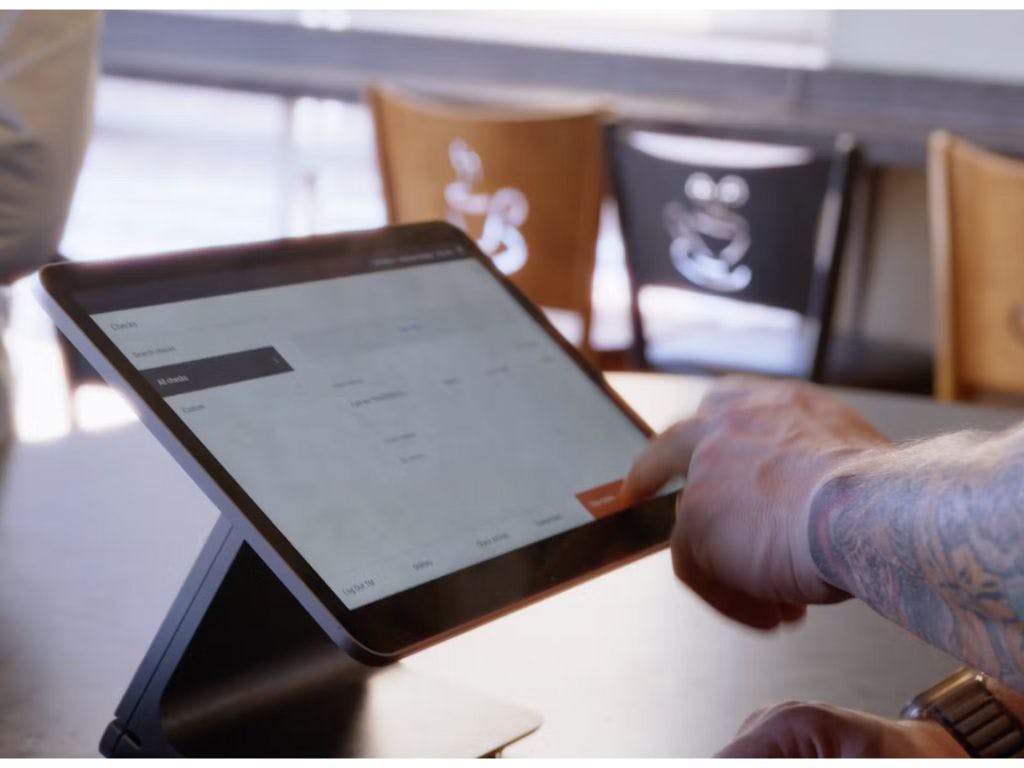
As a national and global leader in restaurant technology and digital order processing, Otter’s all-in-one POS platform offers a diverse collection of built-in apps for business data, AI digital promotions, real-time analytics, and more. Otter’s single piece of core hardware is designed to keep operations running smoothly by consolidating them all into one screen. Experience live alerts, low processing fees, and more! Otter’s modern ecosystem features many valuable apps to help expand your long-term business and sales across real-world and online storefronts.
Pros:
- All-in-one software that consolidates everything your business needs into one screen
- Speed-focused POS functionality that makes training staff easy and accessible
- Seamless software updates, ensuring stability, accessibility, and continuous innovation
- The first POS made with direct, all-in-one integrations and apps
- Multi-location and multi-channel management for menus, sales, and more from a single platform
- 24/7 support and defect management to solve issues in real-time
Cons:
- Platform focuses on digital services, with few tools for physical menus
- Basic functionality for staff management
- Currently not made for full-service restaurants due to lacking table management features
Pricing: POS features range from $19/mo (with 3.19% + 15¢ per order) to $59/mo (with 2.99% + 30¢ per order). Various add-ons are available from $10/ to $99/month. Learn more here.
Recommendation: Otter’s greatest benefit to restaurant owners – and small, quick-service eateries especially – is in the amount and depth of features it provides through just one piece of hardware. Everything in Otter’s ecosystem, like POS functionality, menu management tools, and real-time menu management, can be utilized by any staff member in an efficient, accessible way. This makes Otter POS a critical piece of order technology for single-location restaurants that need to serve many customers quickly, keeping speed, productivity, and profit high.
Why is Otter ideal for small, quick-service restaurants?
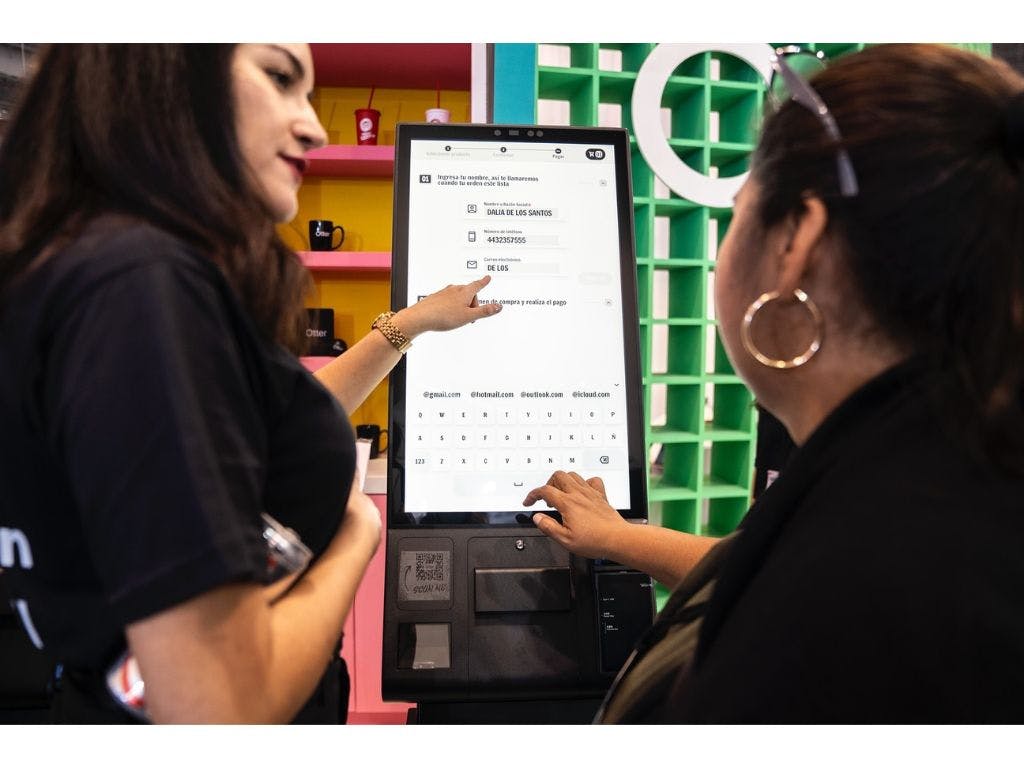
Out of all the POS solutions we’ve listed in this article, Otter POS is the only platform designed specifically for the needs of today’s independent, quick-service eateries. Each of our system’s built-in solutions makes your orders faster, easier, and more profitable, giving your team the time and resources it needs to provide the best service possible. Our range of 100+ integrations, alongside key Otter apps like Menu Management, Online Ordering, and AI Promotions, ensure you have every tool you need to help your business run smoothly across digital and real-world channels.
Through a single iPad-like interface, Otter POS provides critical restaurant management activities to independent cafes, bistros, pop-up eateries, kiosks, ghost kitchens, and more! Our client base of small, quick-service restaurants uses Otter’s array of cloud-based features to speed up their operations, supporting their teams in driving more orders and profit. They also enjoy built-in connections with today’s most popular restaurant apps, like DoorDash, Grubhub, and Uber Eats, creating a diversified revenue stream beyond their store.
When your small or quick-service eatery works with Otter POS, you enhance the value of every dish you serve, no matter what kind of business you’re operating. You simplify staff workflows across your entire restaurant, and deliver better experiences for today’s discerning eaters through apps like Order Management, where you can edit and customize orders as needed. Whether you’re adopting your first POS tool or switching over from another one, Otter’s accessible user interface and tiered pricing model eliminates operational barriers, putting your business on the fast track to success.
Small/Quick-Service Restaurant POS System FAQs

Do small and quick-service restaurants have different needs than full-service eateries?
Yes! Small and quick-service eateries need to accommodate a higher number of orders than larger restaurants in a smaller amount of time, so optimizing for speed and efficiency is essential. Choose a POS system that helps your staff serve many customers rapidly.
As a small/quick-service restaurant owner, can I expect to pay less for a POS system?
It depends on the provider you choose. Many POS brands, including some listed above, offer special discounts or promotions for businesses that only operate a single location. Be sure to inquire about possible savings when speaking to your provider’s Sales team.
Does my small/quick-service restaurant really need a POS system?
Yes, it does! In today’s restaurant landscape, keeping track of orders without POS technology just isn’t feasible – and neither is maximizing revenue. A powerful POS solution acts as your business’s credit card reader, accounting software, table management tool, and more!
Beyond credit card processing, what other features should I want in a POS tool?
As a small/quick-service restaurant owner, you’ll likely also want functionality for building loyalty programs (through gift cards, etc.), takeout service, and add-ons for delivery platforms (DoorDash, Uber Eats, etc.) to keep several revenue streams open at once.
Does my POS system’s amount of physical hardware affect my restaurant’s service?
Yes! Small and quick-service restaurant staff need the ability to address several orders as quickly as possible, and POS platforms that require multiple pieces of hardware can slow service significantly. All-in-one POS solutions are preferred for independent eateries.
What are some questions that I should be asking my POS provider before I commit?
Once you’ve expressed interest in a certain POS platform by reaching out to a representative or booking a demo, you’ll have access to your provider’s Sales team. Take advantage of their willingness to connect with you by asking critical business questions like these:
- What specific benefits does your platform offer small/quick-service restaurants?
- Alongside a POS terminal, what other pieces of hardware does your system require?
- How many third-party integrations does your platform offer, and for what activities?
- As a small/quick-service restaurant, am I eligible for any promotions or discounts?
- Can your platform sync apps and data with my team’s Apple/Android devices?
- Does using your POS tech mean that I’ll be signing any exclusivity contracts?
- If I want to scale up my restaurant in the future, will your platform still be effective?
Help your small eatery earn big profits with great POS tech!

Now that you know what a strong POS platform can offer your restaurant, the right solutions for steady, reliable orders are within your grasp. Share what you’ve learned from this countdown with your team, and understand their own thoughts and opinions to make sure the POS tool you choose can address them and grow with you over the years. Engage deeply with any potential providers before you make a commitment, and stay aware of the additional benefits every system can lend to your business. A great POS suite can make any small or quick-service restaurant a huge success!
Book a demo with Otter
It’s time to enhance your operations with Otter’s all-in-one restaurant platform. Book time with our sales team to learn more.








